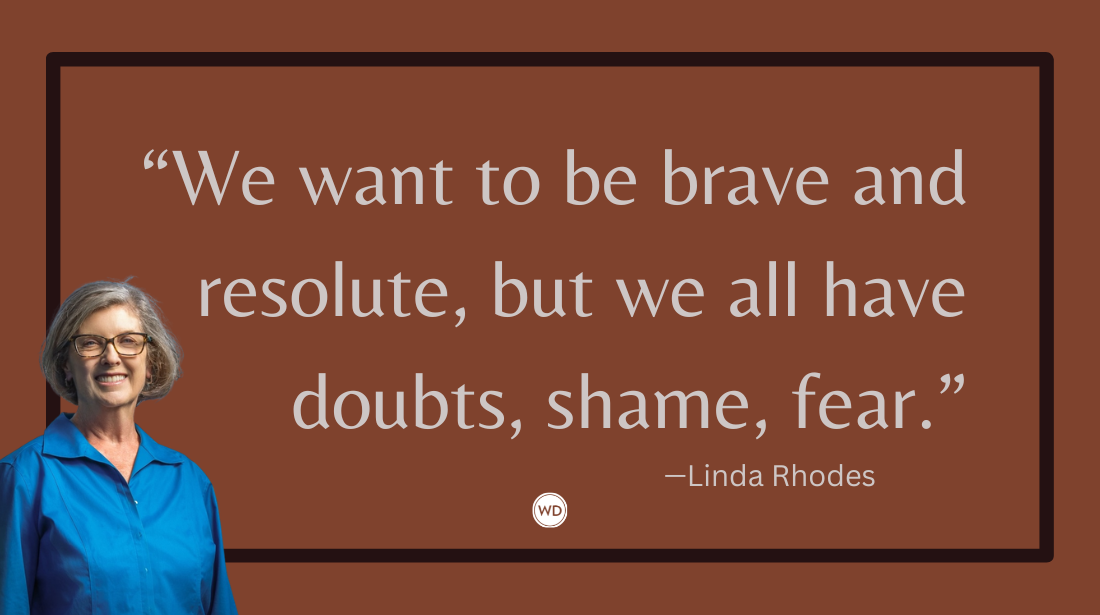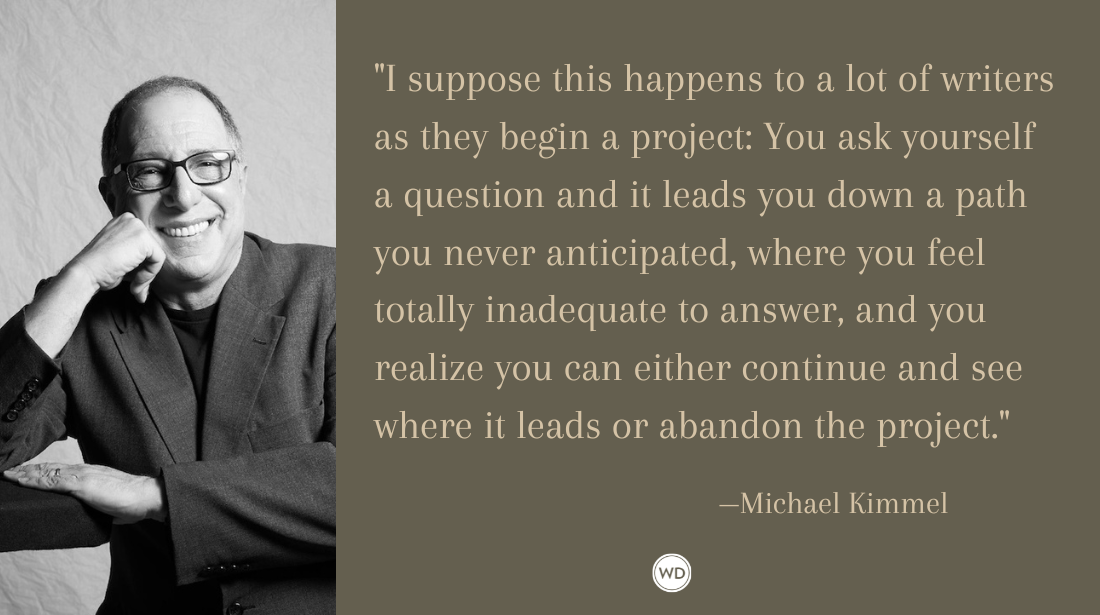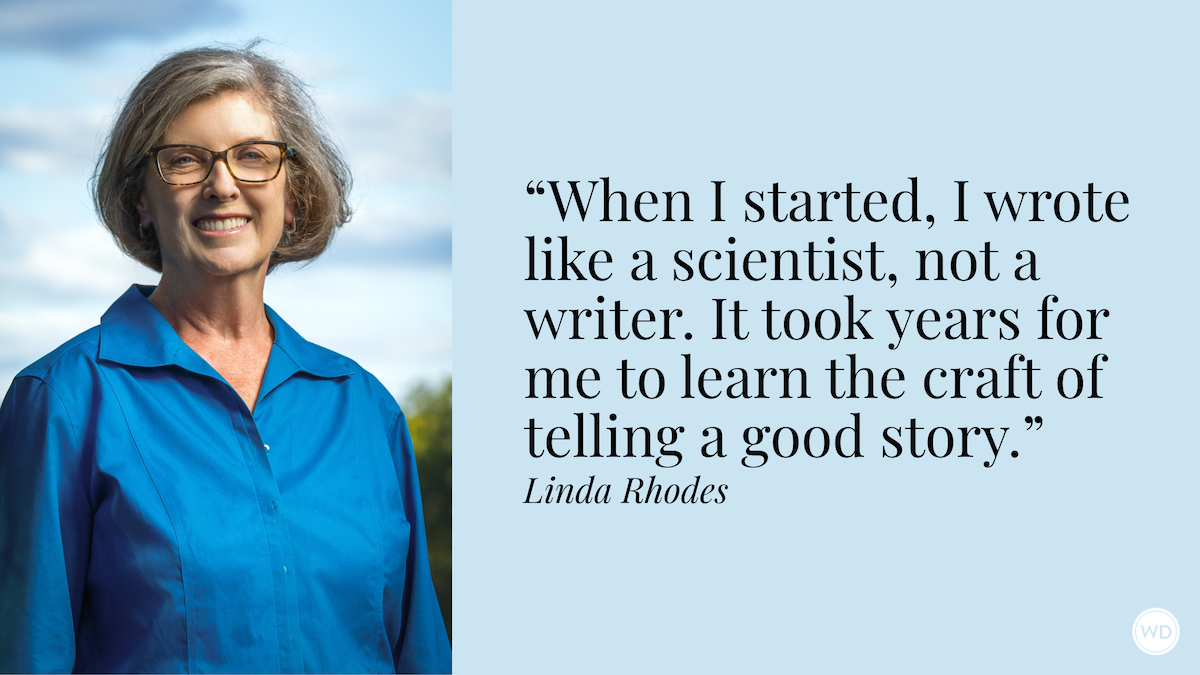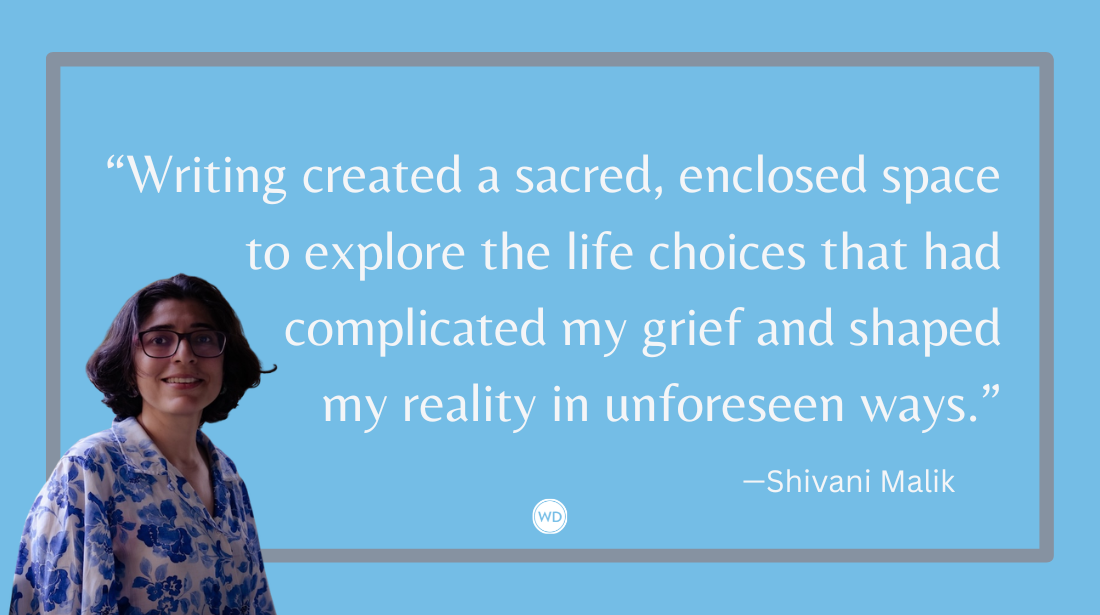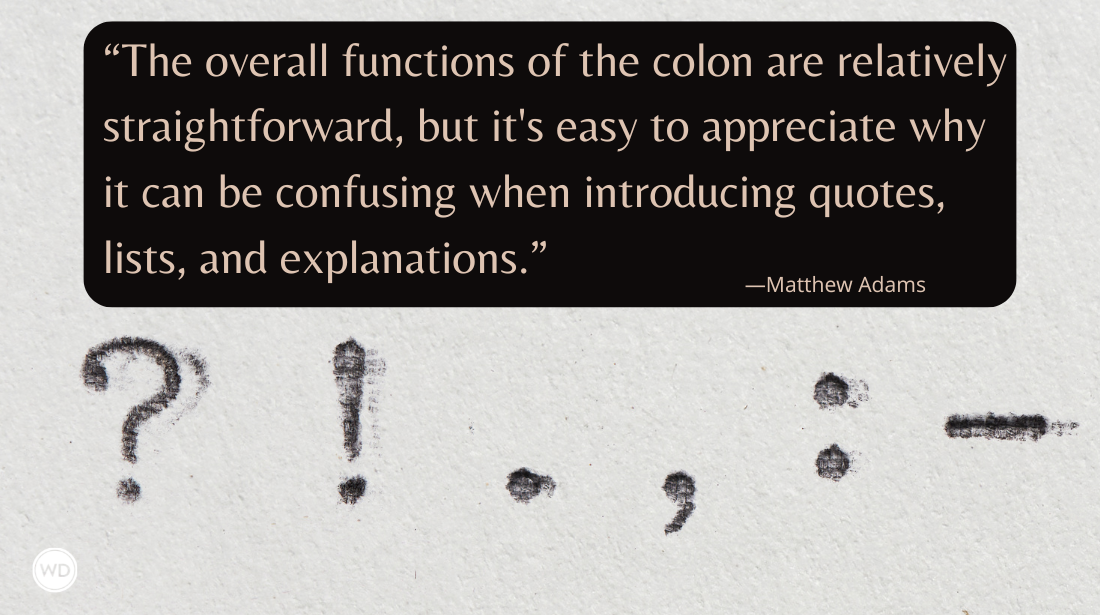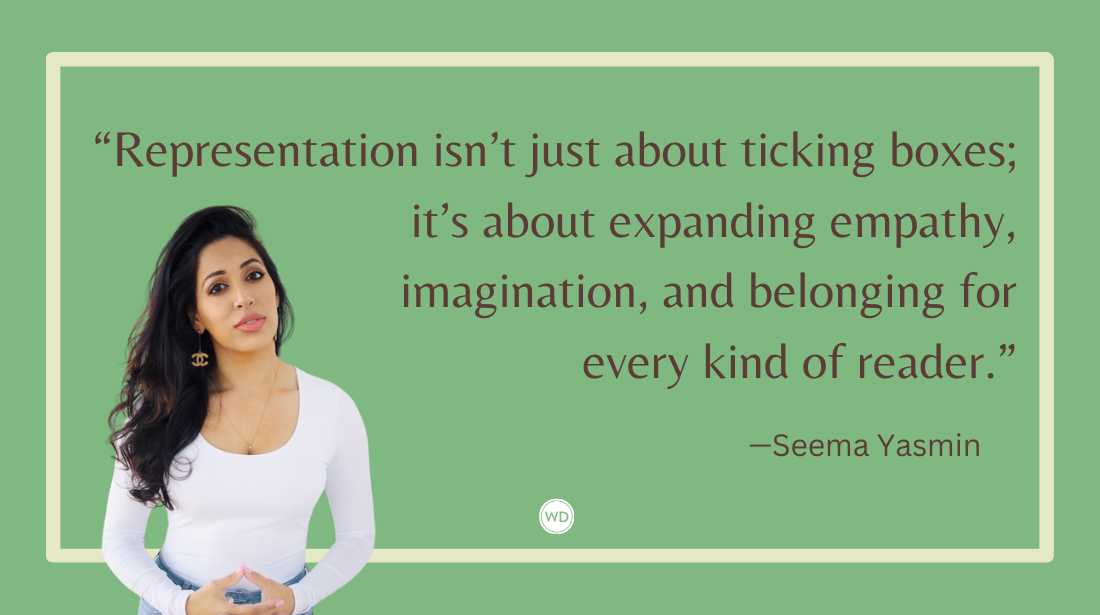Writer’s Digest 94th Annual Competition Nonfiction Essay or Article First Place Winner: “Little Black Book”
Congratulations to Rebecca Victoria Blanchard, first-place winner in the Nonfiction Essay or Article category of the 94th Annual Writer’s Digest Writing Competition. Here’s her winning article, “Little Black Book.”
Congratulations to Rebecca Victoria Blanchard, first-place winner in the Nonfiction Essay or Article category of the 94th Annual Writer’s Digest Writing Competition. Here’s her winning article, “Little Black Book.”
Little Black Book
by Rebecca Victoria Blanchard
At the kitchen table, you drank your coffee and you wrote. I caught you sometimes, early in the morning, chewing on your glasses, scribbling in your black leather notebook, and I wondered what you wrote that captured your attention. Wrapped in your purple velour bathrobe, the smell of coffee, of burnt toast, untouched, your auburn and gray hair wildly independent, you seemed so focused, though not on us which I found disconcerting.
Sometimes, when you didn't notice me, I watched you, how different you seemed sitting there, writing, tugging absent-mindedly at a solitary piece of hair that dripped down your forehead. All your concentrated effort on the little book, scribbling, scratching out, confiding in it that which we would never be privy to, long sentences that seemed to flow effortlessly out of the end of your pen as it tried to keep up with your thought processes. We would never know this side of you.
You were always so self-conscious, so nervous about drawing attention to yourself, but so many people felt the impact of you. It's funny, for as much as you tried to hide in the shadows, you lit them up with your very essence more than any of us who strove only for the limelight. We vied for your attention, knowing your praise, deserved or otherwise, would propel us to where we wanted to go. I used to wonder how you found the time, until one day, I realized you gave us your time, too.
About your artist friend Max, the boy who gave you the gold locket and the love letters we found in your closet and read. Are you sorry now you didn't take up with him, spend your life creating, starving artists, rich in love? How dull we must have seemed by comparison, with our whining demands for clean laundry and dinner. No wonder we found milk in the cupboard and the iron in the refrigerator. No wonder you always burned the biscuits even though you set the timer and stood, like a guard at the oven door. So many times we'd come into the room to find it beeping, and you, puzzled over why you had set it in the first place.
I guess we didn't leave much room for you, your high-strung family of extroverts, always seeking a spotlight, pushing and shoving if someone else got to it first. We always just assumed that if you wanted something from us, you would speak loudly enough, like us, to allow your words a voice that might penetrate the din of noise pollution we produced. It never dawned on us, on me, that you could feel differently, quiet, soft-spoken, a little afraid. After all, in praise of us, you sang loud and clear. I only hope you can hear me now, singing yours.
Oh, you had your wild side, on Saturdays, when garage sale signs lined the streets and you could barely take the time to finish breakfast for fear you'd miss all the good stuff. Then, all the rules changed, as minor traffic laws and driver courtesy became petty annoyances preventing you from a lawn full of junk on the other side of a busy highway, a time when illegal U-turns met with little resistance and red curbs designated reserved parking for your old, black El Camino.
I still have the little couch I found at the yard sale in North Hollywood, the one that the pushy, obnoxious woman tried to buy out from under me. You came to my defense, spoke right up to her, though I knew, if you had discovered it instead of me, the old crow would have staked her claim to it without reprisal. You hated confrontation more than just about anything except maybe someone taking advantage of the underdog, or your children.
You always bought weird, heavy things like slabs of marble or cement bird-baths or bricks. To you, finding bricks resembled a pot of gold at the end of a rainbow. You loved to create secret paths all over the yard, most of which led to nowhere. Once, you loaded down the back of a Studebaker station wagon with so many bricks, you wrecked the whole rear end, shocks and all. Though it dragged on the ground the whole way home, those bricks belonged to you, and nothing would stand in your way. Dad flipped when we pulled into the driveway, ripping deep grooves into the asphalt as we lumbered up the hill. It took everything in my power to keep from laughing while you related the tale of the drive home and how people on the freeway should be more considerate of slower drivers, especially when it's obvious they're doing the best they can, considering the bricks and all... You know, for someone who always forgot the punchline when they tried to tell a joke, you told one heck of a story.
The stories you told always contained some watered-down moral lesson, a weakness you had fallen prey to as a child, like stealing the flowers out of Mrs. Gray's yard. You felt such shame that you hid them behind the refrigerator at home so your own mother would never know her child’s evil ways. The flowers sat there for years, a daily reminder of your heinous crime, never spoken of, until I got caught for shoplifting at Montgomery Wards. Then, in a conspiratorial tone, you confided in me your most sordid tale so as to allow me the excuse of humanness as my defense. You never wanted it to hurt too much, just enough to sting a little.
You thought doctors often overlooked the human side of things, like explaining why your sister's lung cancer, or your father's, or your mother's, would very likely kill them. Or, why the radical mastectomy you underwent the year before, and all the chemotherapy and all the radiation and all the debilitating sickness that came along with these procedures, did nothing to stop the spread of cancer in you. Nor did they explain to you why you would not see your grandson graduate from college, or marry, or your granddaughter become the first woman President of the United States, or why you would never know one of them, at all.
You revered good health and health food guru Adele Davis, pored over her cookbooks as if they contained holy scriptures, made wheat rolls with enough healthy ingredients in them to render them inedible, and tried each new homeopathic remedy to hit the market, long before it came into vogue to do so. Few new fads or concoctions went untried. You fed us tablespoons of honey, carrot juice, and vinegar water for an upset stomach, all introduced by the now infamous words, "I read this article..." and we knew that, at least for a while, we would act as guinea pigs for your latest experiment. How I miss sampling your brews and your tales of old wives.
In August, for your birthday, we'd go shopping along the Sunset Strip, a birthday present to yourself, you would say. But the bags and bags of stuff always turned out to be full of things for me when we laid them out on the bed at home. That way, Dad yelled at you instead of me for spending too much money on my school clothes. It seemed so commonplace for you to take the blame; I don't remember feeling bad about it. But, now, as I write in my own journal, dumping hurt and pain upon the pages, I wonder if your little black notebook did the same for you, if its pages held onto the pain you wanted to unload. I wish I could take the blame from you now. But I let you for so long, I ran out of time.
Mother's Day, 1986, the cancer had taken control of you, lived with you for three long years. Your children, wanderers by nature, carried on with their lives, always knowing, never believing, that you were going to die. We also knew our time with you could not be taken for granted, so on that Mother’s Day, we flew and drove from all directions of the country to celebrate you. Dad said you could not get out of bed, that the radiation and "chemo" had made you so weak we might not get to talk to you at all. Imagine our surprise when we arrived to find you standing in the kitchen, cooking a welcome home dinner for us. Your cheeks full of color, radiance, you stood over the hot stove, downplaying your illness as an over-exaggeration by Dad. We begged you to sit down, to rest, let us cook for you, but you said you wanted to be a Mother for Mother's Day, and your eyes reinforced your words. As evening fell, your face, strained with fatigue, showed all the signs of the illness devastating your frail body. You settled yourself back into your wheelchair as though you finally belonged there, never to rise from it again. Two weeks later, we lost you.
The day you died, I took the black leather book from your house and put it on a shelf in my bedroom to keep it safe from harm. I looked at it every day, without opening it, wondering if I had the right, or the inclination. I thought about my own journals, the ones I write in the early morning hours, while drinking tea, wrapped in my robe at the dining room table, savoring the few moments I have each day before the kids bombard me with cries of missing socks and dirty gym clothes. In the early morning light, I realized I could not invade your privacy.
After the kids went to school that morning, I took the book down from the shelf and lovingly touched the worn cover, almost able to feel your touch in doing so. Then I drove to that little spot at Laguna that you loved so much and tossed your dreams, your fantasies, and your sadness out to sea. I realized at that moment I would never know what you found so compelling on those quiet mornings so long ago. But, somehow, I knew all that I needed to know.




